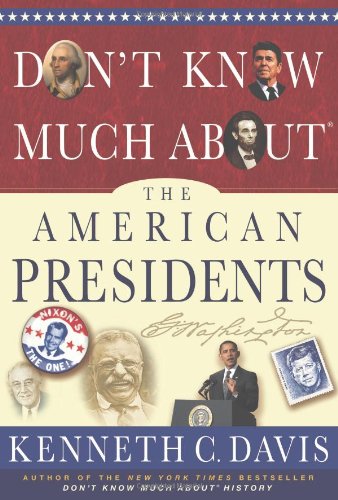
Don't Know Much About the American Presidents
کتاب های مرتبط
- اطلاعات
- نقد و بررسی
- دیدگاه کاربران
نقد و بررسی

Starred review from October 8, 2012
In this presidential election year, bestselling author Davis (Don't Know Much About History) returns with an absorbing take on the American presidency. Like his previous works, this hefty but breezy compendium offers brief assessments of America's chief executives, accompanied here by quotes (often clipped from inauguration speeches), a timeline featuring key moments of their life and term(s) as president, and miscellaneous trivia about each commander-in-chief, concluding with a "final judgment" of their legacy complete with a letter grade. Of course some presidents (e.g., Washington, Lincoln, and FDR) get more in-depth coverage than others. (e.g., William Henry Harrison, Grover Cleveland) and Davis, not one to mince words writes in his assessment of Franklin Pierce: "Good looks, breeding, brains and piety do not a good president make." Davis's bipartisan analysis offers a refreshingly agnostic look at the fumbles, foibles and victories large and small that make up a presidential term. Loaded with dishy trivia (Gerald Ford was a male model, FDR tried to have "In God We Trust" removed from currency) and succinct analysis of pivotal events like Watergate, the election of Lincoln ("the most momentous in American history") and America's involvement in WWI, Davis remains a highly informed, observant student of history eager to share his discoveries and knowledge.

November 26, 2012
Davis’s latest historical reference explores the presidency as an institution and the individual lives of the men who have served as America’s commander in chief. The book’s shifts between narrative and encyclopedic elements would likely have presented a solo reader with a serious challenge in maintaining fluid narration. Luckily, the collaboration between Arthur Morey, Kirby Heyborne, and Mark Bramhall does just that. In performing the book’s main narrative, Morey adopts the tone of a kindly professor, balancing the seriousness of the subject with the need to engage with his audience. When pronouncing the historical judgments of Davis, Morey lets his voice rise and fall to convey the heights of successes and the depths of failures. Heyborne and Bramhall also turn in solid performances—among the highlights are the “Fast Facts” and “Presidential Voices” segments. A Hyperion hardcover.

May 1, 2012
The author of Don't Know Much About History and similar titles returns with a sometimes-saucy handbook on the American presidency. As is the case with other formulaic volumes, this one can weary readers determined to journey through its many pages. After his introductory material on the Founding Fathers' debates about the nature of the presidency, Davis focuses on each of the presidents, in order, offering subsections like "Fast Facts," "Administration Milestones" and "Must Reads" (including online sources). He also awards an old-fashioned letter grade to each man. Scoring well are Lincoln, both Roosevelts and Reagan; scoring poorly, an assortment of pre- and post-Civil War executives (Pierce, Buchanan, Andrew Johnson--all get failing grades). Davis gives Incompletes to those who served briefly for various reasons (William Henry Harrison, Garfield). In recent times: Clinton gets a B; Bush II, F. The author has found interesting nuggets to scatter along the trail--Buchanan was the first to publish a memoir; Hayes established the White House Easter Egg Roll; McKinley was the last president to have served in the Civil War--and he takes time to explain key historical issues, from Teapot Dome to Watergate to Whitewater to Obamacare. Davis occasionally flashes an attitude, taking a shot at one of Michelle Bachmann's campaign claims about the Founding Fathers and slavery, noting several historical antecedents for our recent financial meltdown, blasting Bush II for Iraq and other messes, and reminding us that President Obama came into office facing problems equaled only by those greeting Lincoln and FDR. These are not positions that will prompt waves of Republicans to purchase the book, but substantive appendixes add both heft and interest. The tedious format only occasionally dulls the author's sharp descriptive and analytical skills.
COPYRIGHT(2012) Kirkus Reviews, ALL RIGHTS RESERVED.

Starred review from November 15, 2012
Davis (Don't Know Much About History) delves into the myth and mystery of the highest office in the United States, beginning with a description of the establishment ("improvisation" in his words) of the government, as well as offering an explanation of what the founders truly believed the executive branch of government represented. In the second section, he gives a description, often detailed, of each presidency and the major issues each man faced during his term. Profiles sometimes make evident the author's politics. For example, he describes Hoover's "bedrock conservative Republican principles" as keeping him from enacting government relief during the Great Depression. Each profile concludes with the president receiving a letter grade; those serving either too short or unfinished terms receive an incomplete. Part Two illustrates to readers that behind every great man is an often equally great woman in its portraits of notable first ladies such as Jackie Kennedy and Sarah Polk. In the final section, Davis explores the powers of the presidency and how they have changed over the last two centuries. VERDICT This book serves to remind readers that, while history has tried valiantly to portray the presidents as perfect, even the men themselves acknowledged "their grievous mistakes." While the book is quite thorough and well researched, and provides welcome additional print and online readings, the conspicuousness of the author's own politics may alienate some readers.--Wayne R. Cherry, Jr., First Baptist Academy, Houston
Copyright 2012 Library Journal, LLC Used with permission.

























دیدگاه کاربران